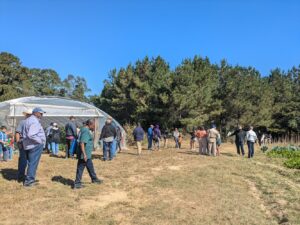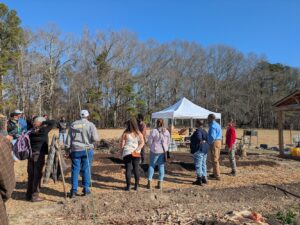Final report for SLA24-001
Project Information
The Louisiana State University AgCenter (LSUAC) in collaboration with the Southern University Agricultural Land-Grant Campus (SUAREC) will implement programs that enhance the capabilities of Louisiana’s agricultural professionals in the area of sustainable agriculture. Themes for 2024-2025 include: advanced organic farmer training, sustainable pest management training, fall garden workshop (market gardening, cooperative functions, zero-waste business models), spring garden workshop (urban agriculture, urban policy, landownership), as well as regional sustainable agriculture related conferences and workshops. The target audience for trainings will be extension, non-profit representative, and mentor farmers who will share information and skills gained with local audiences. LSUAC and SUAREC extension personnel will be strongly encouraged to attend the training sessions. Information delivery systems to be utilized include virtual trainings, workshops, conferences, networking sessions, farm tours, field days, hands-on demonstrations, handouts, resource manuals, SARE publications and informational bulletins. The Louisiana Sustainable Agriculture Advisory Board will meet twice annually for programmatic planning and evaluation. The program assistant (half-time), funded by this project, will be responsible for maintaining the state SARE website (http://www.southernsare.org/SARE-in-Your-State/Louisiana) and Facebook page (https://www.facebook.com/LouisianaSARE/) and a quarterly sustainable agriculture newsletter. The other duties for this position include coordination of state workshops and field days, travel awards and arrangements, promotion of SARE resources and grant opportunities, promotion of related sustainable agriculture resources, events, and opportunities across the state, management and reporting of the PDP organization of advisory board, and collaboration with advisory board members’ programs when applicable.
-
Outreach Objectives:
- Conduct workshops on sustainable agriculture for extension and agriculture professionals.
- Maintain the state SARE website with sustainable agriculture materials and resources, and links to related state organizations.
- Conduct bi-annual state advisory board meetings with the purpose of revising and modifying the strategic plan.
- Identify annual training objectives with the input from the Louisiana Sustainable Agriculture Advisory Board.
- Encourage extension and agricultural professionals to continue to attend sustainable agriculture meetings such as the Georgia Organics Annual Conference.
- Continue participation in workshops, meetings, and field days that highlight sustainable agriculture practices.
- Promote the SARE program results, resources, and grant opportunities in Louisiana.
The MSP for Louisiana will allow for enhanced programming effort beyond the state plans of work for the separate institutions (SUAREC, LSUAC). The MSP has allowed for the increased number of training sessions per year. The MSP has allowed the Louisiana SARE PDP to have greater resources available for training activities, using the Southern SARE Louisiana webpage for sustainable agriculture resources, as well as increased coordination and networking. The hiring of a program assistant through the SARE PDP allowed for a unified sustainable agriculture programming effort for the state.
The Louisiana Sustainable Agriculture Advisory Board meets biannually and reviews the past year’s activities and strategic plan as well as the next year’s activities and plan. The 2024-2025 strategic plan and cycle is proposed to focus on themes different than the previous year. The successive years build upon the past workshops and trainings and the needs of the Louisiana SARE PDP stakeholders and feedback from the participants. This year, an Advanced Organic Farming training will be held because the previous year, we held a Beginning Organic Farming training, not advanced.
Proposed Trainings:
- Advanced Organic Farming Fall 2024
- Travel to SOWTH/GA Organics 2025
- Integrated Pest Management Spring 2025
Advisors
- (Educator)
- (Educator)
- (Educator)
- (Educator)
- (Educator)
Education
The Louisiana SARE goal to is to provide in-person trainings and scholarships for county agents and other agricultural professionals who work directly with farmers in order to receive training they can use to assist and work with producers and their communities in sustainable agriculture.
Our educational approach for our sustainable agriculture extension programming for Louisiana has two components:
1. To provide in-person trainings where the target audience consists of extension agents, mentor farmers, producers’ associations, local, regional, state and non-profit organizations, and others that work directly with growers.
2. To facilitate participation by extension agents, nongovernmental organizations, growers and industry representatives, and representatives of non-profit, local, regional and state organizations in on-farm and on-station research, grower assessments of demonstration and research trials, workshops, and on-farm and on-station field days either in state or in the southern region.
Education & Outreach Initiatives
To gain practical knowledge, share experiences, and build connections that can enhance our work in agriculture.
The SOWTH 2025 Conference, held from February 4-6, 2025, held in Atlanta, Georgia. This conference provided a multitude of networking opportunities for farming professionals, food system professionals, researchers and more. Ten individuals were able to attend this conference, 8 of the 10 were able to attend due to funding provided by the SU MSP SARE program.
All attendees unanimously agreed that they were able to form brand new relationships with other agencies, organizations, farmers, and other individuals across the region and was followed with contact information being exchanged and connections maintained. Overall, they each were able to takeaway valuable information to improve farm practices, promote sustainable agriculture, and build a more resilient and equitable food system. They also acquired various farming tips to share with others upon their return.
Due to commitments with other programs, the team was unable to organize an Advanced Organic Farming Workshop in the Fall of 2024. Instead, our efforts were put towards a collaborative effort, the Fencing Workshop put on by LGLCI (Louisiana Grazing Lands Conservation Initiative). As fencing is the largest expense a farm can have, we consistently get questions about the cost, techniques/logistics/planning. This workshop served to answer these questions.
This workshop was a beginner-intermediate fencing workshop, taught by Mr. Wedge Barthe, electric fencing expert, Josh Phares, fencing contractor, and Dr. Glen Gentry, long-time experienced fence builder and educator. This event took place in Clinton, LA, and was an all day training 8am-3pm. Each participant took home a free fencing kit, provided by LA SARE funding.
This workshop had 30 people in attendance, each receiving one fencing kit provided by LA SARE.
Attendees learned how to build and repair hard wire + electric fences during this hands-on all-day workshop.
Other topics of discussion were rotational grazing, pasture health, and selecting livestock genetics.
Due to commitments with other programs, the team was unable to organize an Integrated Pest Management Workshop in the Spring of 2025. Instead, our efforts were put towards a collaborative effort with the Grow Louisiana Beginning Farmer Training Program to put on the Beginning Organic Farming Workshop. This workshop was held on April 26, 2025.
The Beginning Organic Workshop serves the need for more direct-to-consumer horticulture growers in Louisiana. This workshop covers topics like sustainable production, soil fertility, marketing, business planning, postharvest, farm design, infrastructure, and pest/disease management. Daniel Parson of the Oxford College Farm at Emory University gives this presentation.
We had 32 attendees at this event, each received a SARE Library USB. Participant surveys indicated the following topics were most useful:
-pest life cycles and management
-weeding tools and practices
-business management
-hearing the speaker's lived farming experiences
Educational & Outreach Activities
Participation summary:
Learning Outcomes
Project Outcomes
Face of SARE
Outreach and promotion of the SARE program consisted of a combination of community engagement, strategic planning and partnership, and educational efforts. Through this intentional combination we were able to raise awareness and encourage participation in proven beneficial farming methods and gardening practices. We hosted hands-on workshops and fields days where we educated farmers, agricultural professionals, ranchers, and environmentally responsible agricultural practices. Collaboration with local extension services within various parishes, which included extension agents and educators, assisted in disseminating SARE information through local publications, meetings, and consultations with farmers in a group setting in rural communities. Online platforms and social media were used to promote webinars and in-person workshops. Farm tours and demonstration projects were utilized to serve as powerful and impactful educational tools in order for farmers and aspiring farmers to see firsthand the multitude of techniques that can be implemented in the field. We also partnered with local organizations to increase visibility for the SARE program and promoted SARE's funding opportunities and resources for farmers looking for resources and what they would be eligible to apply for as a farmer.

